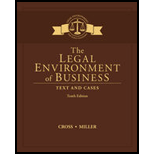
Case summary:A person, GF joined a university, KS as a head coach for men’s basketball team with a five-year contract and with a salary of $300,000. In case of breach of contract by GF, he will be liable to pay liquidity damages that will be equal to the salary received by him multiplied by the number of years remaining for the expiry of the contract. GF left the college four years before the termination of the contract. GF joined another university B at a salary of $700,000. University KS filed a suit in Ohio state court, against GF. The court enforced the liquidity damages clause and awarded the university $1.2 million. GF appealed arguing that the liquidity damage clause was an unenforceable penalty.
To explain: The impact of the record of the basketball team on the decision of the court.
Want to see the full answer?
Check out a sample textbook solution
Chapter 13 Solutions
Lms Integrated Mindtap Business Law, 1 Term (6 Months) Printed Access Card Cross/miller’s The Legal Environment Of Business: Text And Cases, 10th
- in united states supreme court through (22 term October 2022-present) the Andy Warhol Foundation for the Visual Arts, Inc. v. Goldsmith case what is it about and why was it important and why should people choose that particular case? Andy Warhol Foundation for the Visual Arts, Inc. v. Goldsmitharrow_forwardA) Under what circumstances might a court have committed the cellophane fallacy? B) In the Google Shopping case, Google was found to have abused its dominant position under Art 102 TFEU. On what grounds did the courts find Google guilty?C) In the Microsoft case, Microsoft was found to have committed an offence under 102 TFEU. What was the offence, and why is it a problem for Microsoft and not for other competitors.D) Suppose a firm can produce for a marginal cost of 2 and receive a price of 4. What would the elasticity of demand for its product be?arrow_forwardWhat is the significance of a proxy statement in corporate law?arrow_forward
- With reference to the English Legal System:a) Explain, identify and illustrate three rules of statutory interpretation. b) Explain mediation and arbitration as alternative methods of resolving civil disputes and the advantages of these alternatives compared to taking action through the civil courts. c) Identify and explain the key differences between Civil & Criminal Law.arrow_forwardDoes the concept of judicial interpretation of the law mean that judges can make whatever law they wish? And, how can courts remain flexible, if they are required to follow precedent?arrow_forwardKindly prepare five (5) objectives for the post of Court Administrator Administrative in the Caribbean Court of Justice, Montserrat Circuit.arrow_forward
- Discuss the legal implications of Title VII and all the potential legal consequences that may arise from it.arrow_forwardDiscuss the competing interests at issue in antitrust cases where state-action immunity may be available to the defendant. Why does the United States have such a doctrine?arrow_forwardGive an example of a statute at the Federal Level and at the State Level. Give an example of an Administrative Agency at the Federal level. Please list the 3 equitable remedies available to someone in a lawsuit.arrow_forward
- With reference to the English legal system: a) elaborate on what is meant by common law and its advantages and disadvantages b) identify the key characteristics of case law (how cases are decided) and explain the doctrine of precearrow_forwardDiscuss what is intoxication in law ? How can an person avoid a contract entered into under intoxication? a) Discuss in detail the following relevant case law on this matter and discuss in detail. Discuss the outcomes in this case. Gore v. Gibson 13M b) What is Frustration in law? Critically discuss. Discuss in detail the following relevant case law on this matter and discuss in detail. Discuss the outcomes in this case. Taylor v. Caldwell (1863)arrow_forwardPlease do not give solution in image formate thanku. Please review the case titled Drake Manufacturing Company, Inc. v. Polyflow, Inc. in the textbook and submit a written response summarizing what happened in the case (i.e., a summary of the facts). Be sure to include the following in your summary: Who are the parties in the case? The parties in this case are Defendant, Drake Manufacturing Company, Inc. and Plaintiff, Polyflow. Do you believe that Drake Manufacturing Company, Inc. was doing business in the state for the purpose of being required to qualify to do business?arrow_forward
 Purchasing and Supply Chain ManagementOperations ManagementISBN:9781285869681Author:Robert M. Monczka, Robert B. Handfield, Larry C. Giunipero, James L. PattersonPublisher:Cengage Learning
Purchasing and Supply Chain ManagementOperations ManagementISBN:9781285869681Author:Robert M. Monczka, Robert B. Handfield, Larry C. Giunipero, James L. PattersonPublisher:Cengage Learning
